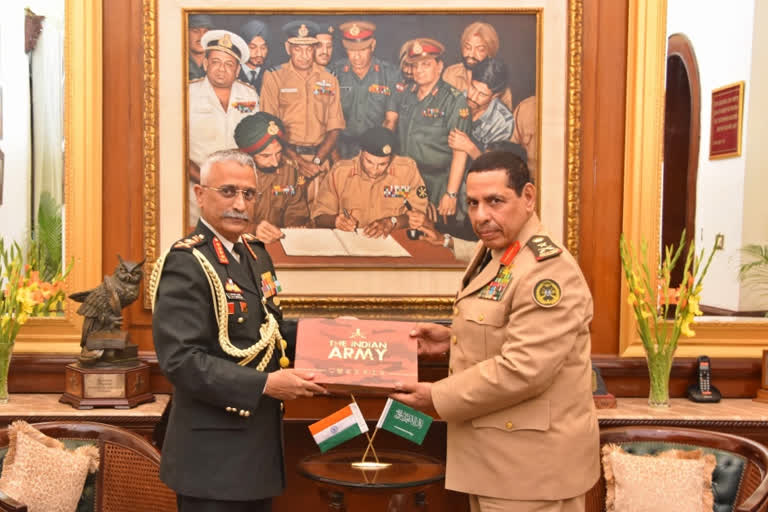New Delhi: If pictures could speak, the photograph of the meeting of the army chiefs of India and Saudi Arabia involved in intense discussions on Tuesday would be singing—in a striking strong reflection of the changing equations in West Asia.
Seated just below the large sized photograph of December 16, 1971 with Lt Gen AAK Niazi, Pakistan Army’s commander in East Pakistan (now Bangladesh) signing the surrender of his forces before India’s Eastern Army Commander Lt Gen Jagjit Singh Arora, the two army chiefs—General Manoj Mukund Naravane and his Saudi counterpart Lt Gen Fahd Bin Abdullah Mohammed Al-Mutair—made for a very telling metaphor.
Incidentally, this is the first ever visit of a serving land forces chief to India while Gen Naravane visited Saudi Arabia in December 2020. The initial military byproduct of such a warming of ties may be the expected firming of dates for an exercise by the armies of the two nations for which an Indian Army contingent would depart for Saudi Arabia in a few months from now.
Also read: Army Chief General Naravane speaks to top Saudi commander
Decided earlier, the planned exercise did not take off due to the raging coronavirus pandemic. The army exercise will follow the first ever naval bilateral exercise “Al Mohed-Al Hindi” that took place between the navies of the two nations in August 2021 at Jubail in the eastern coast of the Kingdom.
Besides plans in the joint manufacturing of weapons and platforms, other areas of collaboration that are understood to be gathering traction are in the realms of intelligence sharing and counter-terrorism besides in the niche domains of Artificial Intelligence and cyber security.
Strategic Ties
Traditionally close to Pakistan, Saudi Arabia’s ties with Pakistan have gone frosty over the years. On the other hand, India’s ties with Iran—earlier a bulwark of Indian interests in the Muslim world—has entered a rough phase.
With Pakistan and Iran having identified common interests and with Iran now upping the ante by effecting drone attacks on Saudi and UAE targets through its proxy—the Yemen-based Houthi rebels—it is only obvious that India and Saudi Arabia develop an enhanced understanding.
Also read: Drone attack on Saudi airport wounds 8, damages plane
The changing dynamics have changed equations on the respective positions on the Kashmir issue. That is why on the controversial abrogation of Article 370 in Kashmir, Iran did not mince words with its supreme leader Ayatollah Ali Khamenei admonishing the Indian government to “adopt a just policy towards the noble people of Kashmir and prevent the oppression & bullying of Muslims.”
On the other hand, Saudi Arabia has declared a stand of neutrality on the Kashmir issue much to Pakistan’s chagrin. As a result, Saudi Arabia and Israel—with close ties to the US and much improved relationship with Israel, which in itself is an anathema in the Islamic world—face a new anti-US grouping outside the pale of OIC which includes Iran, Turkey, Qatar and Malaysia.



